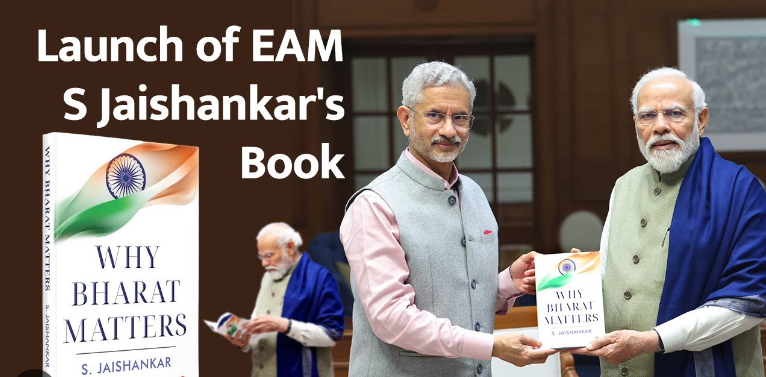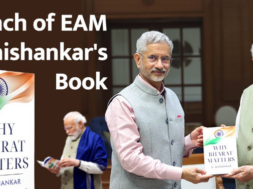
Roving Periscope: India politically ready to navigate the 2024 challenges, says EAM Jaishankar
Virendra Pandit
New Delhi: India is ready and politically well-positioned with a fair deal of confidence to navigate challenges in 2024, External Affairs Minister S. Jaishankar said on Wednesday.
This year, 2024, would remain turbulent for the world but India is well-positioned politically and economically to navigate the challenges and maintain its rising global role and its path of development, he said while speaking at the launch of his new book Why Bharat Matters.
On Thursday, he gifted a copy of this book to Prime Minister Narendra Modi.
In this book, he examined the geopolitics and various aspects of India’s foreign policy since Independence using the Hindu epic Ramayana as the overarching perspective, according to a media report.
“I do think that 2024 will continue to be turbulent, (and) that many of the same factors which drove 2023 would remain very much in play,” he said, addressing a group of foreign diplomats, strategic affairs experts, academicians, and intellectuals.
“Today where we are positioned, where we are positioned politically, where we are positioned economically, when you look at a lot of these societal changes and the capabilities that have grown, I would say at the end of this conversation, I’m closer to saying we have strung the boat,” Dr. Jaishankar said at the event hosted by leading think-tank Observer Research Foundation (ORF).
Delving into India’s engagement with China after Independence, referring to first Prime Minister Pandit Jawaharlal Nehru’s policy, he said if the approach had been “more Bharat, we would have had a less rosy view of our relationship with China.”
He especially noted this for the first decade after Independence.
“And this is not something which is my fantasy. I mean there is a kind of record out there. There’s an exchange of letters between Sardar (Vallabhbhai) Patel and Pandit Nehru about China. And they have very starkly differing views,” Dr. Jaishankar said.
He also cited China getting into the UN Security Council and Pandit Nehru’s approach to the matter. “I mean there is a letter which Nehru has written to chief ministers saying first let China take its place in the Security Council.”
The EAM also recalled how Pandit Nehru was hesitant in taking assistance from the US following the 1962 war with China as he was unsure how it would be seen.
“There was very ingrained hostility towards the United States,” he said, adding the Americans also did a lot to deserve it.
“But you know, in fact, again it’s an interesting issue where one of the last comments of Sardar Patel on foreign policy was why are we sort of so distrustful of America; we should look at America from the viewpoint of our interest, not from the viewpoint of how the Americans are dealing with China,” he said.
Referring to economic reforms, Dr. Jaishankar said, “We were not sufficiently sweeping in our reforms in the first two decades of reforms.”
“We kind of fell for the mantra of globalization, where we didn’t benefit as much relatively as those who dominated production and those who dominated finance did,” he said.
Replying to a question on internal constraints, Dr. Jaishankar said they were pretty obvious as a lot could have been done in the period after Independence.
“I think the internal constraints are pretty obvious to all of us. It would be that, let us say after the first 60 years after Independence, if you were to look at basic social-economic indicators — how many of your homes were connected to electricity, how many to piped water, you look at your literacy rate, you look at your gender ratio, you look at your nutrition level, you look at your health system,”
“I think it’s fairly clear that in a lot of this, we had not done what we could have done, what other countries who had started in a similar base had done,” he said.
Speaking about his book, Dr. Jaishankar explained how he looked at various aspects of geopolitics and statecraft through the perspective of Ramayana.
“My point is that every ‘Ram’ requires a ‘Laxman’ — that countries are better served if you have reliable friends and allies who can temper you down when you need to be, who can strengthen you when you are down,’ the EAM said, citing an example of lessons that can be drawn from the great Indian epic.













